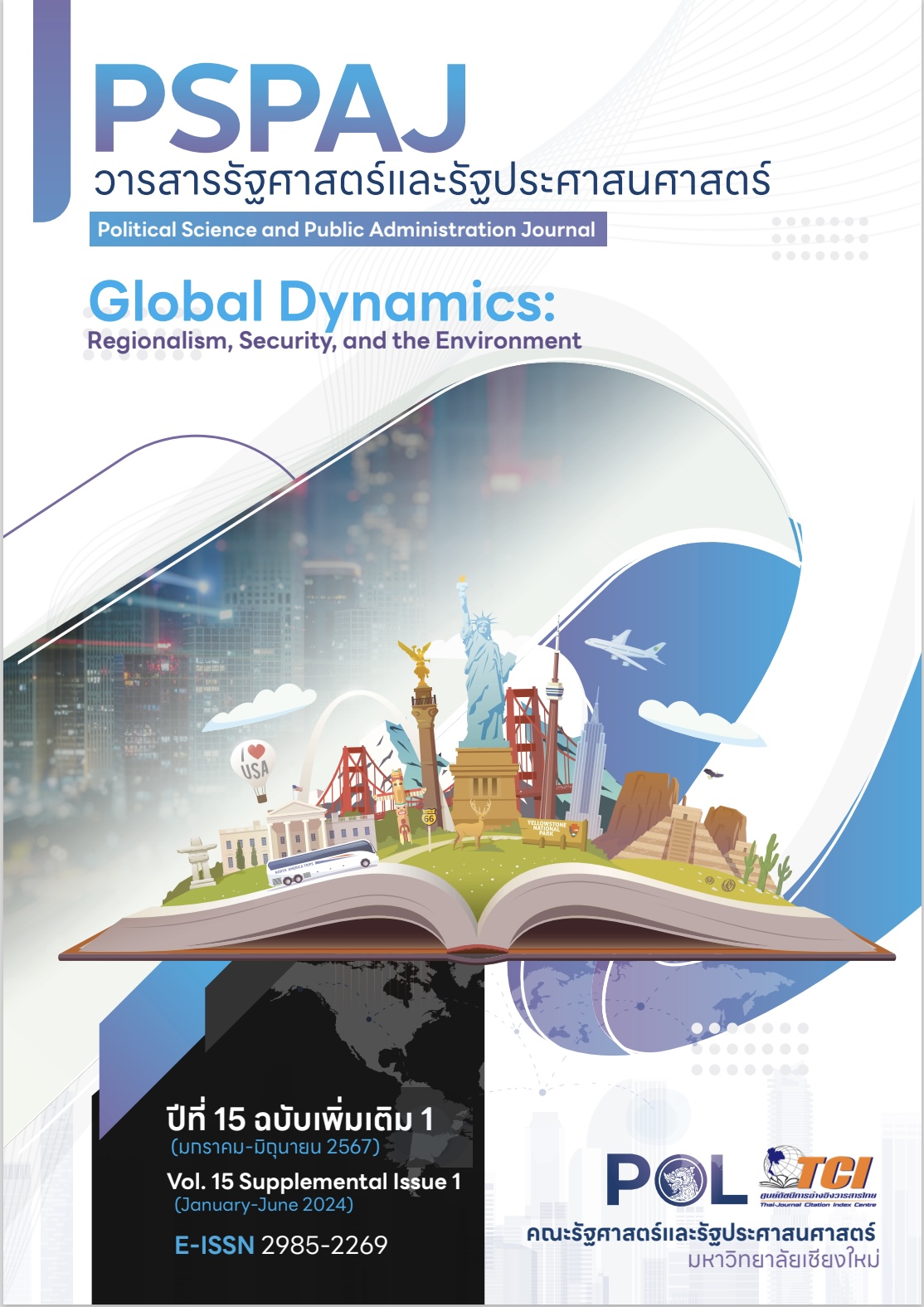Navigating Environmental Security in the Anthropocene: The Potential for Cooperation and Conflict in International River Basins
Main Article Content
บทคัดย่อ
The paper argues that from an analytical perspective, an international river basin (IRB) offers a particular geographic and structural context, as it represents an interrelated, connected, geographic space. Climate change impacts have not only direct consequences for the availability and quality of water resources - spanning from changing precipitation events, flood events, or a higher rate of evaporation - but even more fundamental, long-lasting impacts as the major source of comprehensive environment degradation associated with the Anthropocene approach. When considering the actual and further potential impact on the availability of water resources and the distribution challenge, the prospects for aggravating lingering political conflicts, or even generating new political conflicts between the countries sharing an IRB becomes an even greater possibility. However, it would be misleading to assume that all countries within an IRB are exposed to environmental degradation and climate change impacts to the same extent. It is worth recognising that structural inequality exists within an IRB, that between upstream and downstream countries, as up-stream countries may be in a better situation to address related challenges. Moreover, environmental and climate change impacts in an IRB go far beyond the water resource issue, representing a microcosm for applying the Anthropocene approach.
Downloads
Article Details

อนุญาตภายใต้เงื่อนไข Creative Commons Attribution-NonCommercial-NoDerivatives 4.0 International License.
- เนื้อหาและข้อมูลที่ลงตีพิมพ์ในวารสารรัฐศาสตร์และรัฐประศาสนศาสตร์ถือเป็นข้อคิดเห็นและความรับผิดชอบของผู้เขียนบทความโดยตรง ซึ่งกองบรรณาธิการวารสารรัฐศาสตร์และรัฐประศาสนศาสตร์ ไม่จำเป็นต้องเห็นด้วย หรือร่วมรับผิดชอบใดๆ
- บทความและข้อมูล ที่ได้รับการตีพิมพ์ในวารสารรัฐศาสตร์และรัฐประศาสนศาสตร์ ถือเป็นลิขสิทธิ์ของวารสาร หากบุคคลหรือหน่วยงานใดต้องการนำข้อมูลไปใช้ประโยชน์ในทางวิชาการ ขอให้อ้างอิงแหล่งที่มาด้วย
เอกสารอ้างอิง
Booth, K. (2005). Introduction to part I. In Booth, K. (Ed.). Critical Security Studies and World Politics (pp. 1-20). Boulder, United States: Lynne Rienner Publishers.
Burke, A., & Fishel, S. (2016). Politics for the Planet: Why Nature and Wildlife Need their Own Seats at The UN. Retrieved January 20, 2023, from https://theconversation.com/politics-for-the-planet-why-nature-and-wildlife-need- their-own-seats-at-the-un-59892
Burke, A., Fishel, S., Mitchell, A., Dalby, S., & Levine, D. J. (2016). Planet Politics: A Manifesto form the End of IR. Millenium Journal of International Studies, 44(3), 1-25.
Buzan, B., & Wæver, O. (2003). Regions and Powers: The Structure of International Security. Cambridge, United Kingdom: Cambridge University Press.
Buzan, B., Waever, O, & de Wilde, J. (1998). Security: A New Framework for Analysis. Boulder, United States Lynne Rienner Publishers.
Chakrabarty, D. (2009). The Climate of History: Four Theses. Critical Inquiry, 35(2), 197-222.
Chandler, D., Cudworth, E., & Hobden, S. (2018). Anthropocene, Capitalocene and Liberal Cosmopolitan IR: A Response to Burke et al.’s ‘Planet Politics’. Millennium: Journal of International Studies, 46(2), 190-208.
Crutzen, P., Stoermer, E. (2000). The Anthropocene. IGBP Newsletter, 41, 17-18.
Dalby, S. (2014). After the Anthropocene: Politics and Geographic Inquiry for A New Epoch Progress. Human Geography, 38(3), 442-444.
Delanty, G., Mota, A. (2017). Governing the Anthropocene: Agency, Governance, Knowledge. European Journal of Social Theory, 20(1),
-38.
Editorial Comment. (2003). How Long Have We Been In The Anthropocene Era?. Climatic Change, 61(3), 251-257.
Harrington, C. (2016). The Ends of the World: International Relations and the Anthropocene” Millennium: Journal of International Studies, 44(3), 478-498.
Human Security Unit Office for the Coordination of Humanitarian Affairs. (2009). Human Security in Theory and Practice: Application of the Human Security Concept and the United Nations Trust Fund for Human Security. New York: United Nations. Retrieved June 28, 2021, from https://procurement-notices.undp.org/view_file.cfm?doc_id=11983
Jervis, R. (1978). Cooperation Under the Security Dilemma. World Politic, 30(2), 167-214.
Jones, R. W. (1999). Security, Strategy, and Critical Theory. Boulder, United States: Lynne Rienner Publisher.
Katzenstein, P. (1996). Introduction: Alternative Perspectives on National Security. In Katzenstein, P. (Ed.). The Culture of National Security: Norms and Identity in World Politics (pp. 1-27). New York, United States: Columbia University Press.
Malm, A., & Hornborg, A. (2014). The Geology of Mankind? A Critique of the Anthropocene Narrative. The Anthropocene Review, 1(1), 62-69.
Maslin, M. A., & Lewis, S. L. (2015). Anthropocene: Earth System, Geological, Philosophical and Political Paradigm Shifts. The Anthropocene Review, 2(2), 108-116.
Mitchell, A (2017). Is IR Going Extinct?. European Journal of International Relations, 23(1), 3-25.
Painter, J. (2010). Rethinking Territory. Antipode 42(5), 1093.
Ploberger, C., & Filho, W. L. (2016). Towards Long-Term Resilience: The Challenge of Integrating Climate Change Related Risks into a Risk Analysis Framework. In Filho, W. L., Musa, H., Cavan, G., O'Hare, P., & Seixas J. (Eds.). Climate Change Adaptation, Resilience and Hazards (pp. 369-380). Cham, Switzerland: Springer.
Roach, S. C., Griths, M., & O’Callaghan, T. (2002). International Relations: The Key Concepts. London, United Kingdom: Routledge.
Rowan, R. (2014). After the Anthropocene: Politics and Geographic Inquiry for a New Epoch Progress. Human Geography, 38(3), 477-450.
Ruddiman, W. F., Ellis, E. C., Kaplan, J. O., Dorian Q., & Fuller, D. O. (2015). Defining the Epoch We Live In. Science, 348(6230), 348-389.
Scherrer, W. (2023). Economic Perspective of Cooperation in International River Basins. In Ploberger, C. (Ed.). River Basins and International Relations: Cooperation, Conflict and Sub-Regional Approaches (pp. 51-66). Abingdon, United Kingdome: Routledge.
Simangan, D. (2019). Situating the Asia Pacific in the Age of the Anthropocene. Australian Journal of International Affairs, 73(6), 564-584.
Smith, S. (2005). The Contested Concept of Security. In K. Booth (Ed.) Critical Security Studies and World Politics (pp. 27-62). Boulder, United States: Lynne Rienner Publisher.
Steffen, W., Broadgate, W., Deutsch, L., Gaffney, O., Ludwig, C. (2015). The trajectory of the Anthropocene: The Great Acceleration. The Anthropocene Review, 2(1), 81-98.
Tortajada, C., Fernandez, V. (2018). Towards Global Water Security: A Departure From the Status Quo?. In Gaymard, E. (Ed.). Global Water Security Lessons Learnt and Long-Term Implications (pp. 1-20). Cham, Switzerland: Springer.
UN News Centre. (2022). Water is ‘catalyst’ for Cooperation, Not Conflict, UN Chief Tells Security Council. Retrieved March 23, 2022, from https://www.unwater.org/news/water-%E2%80%98catalyst%E2%80%99-cooperation-not-conflict-un-chief-tells-security-ouncil#:~:text=Stressing%20the%20importance%20of%20diplomacy%20to%20prevent%20and,even%20those%0that%20are%20not%20on%20good%20terms
UNEP. (2021). Adaptation Gap Report 2021. Retrieved November 19, 2021, from https://www.unep.org/resources/adaptation-gap-report-2021
UNESCO. (2016). Transboundary Water Cooperation and the Sustainable Development Goals. Retrieved February 9, 2023, from https://unesdoc.unesco.org/ark:/48223/pf0000244045?posInSet=7&queryId=N-2ba4c09a-e290-4e3d-9035-53ef4e705004
Walker, R. B. J. (1997). The Subject of Security. In K. Kraus, M. C. Willams (Eds.). Critical Security Studies (pp. 61-82). London, United Kingdom: UCL Press.
World Economic Forum. (2022). Global Risk Report 2022. Geneva: World Economic Forum. Retrieved January 10, 2022, from https://www3.weforum.org/docs/WEF_The_Global_Risks_Report_2022.pdf


